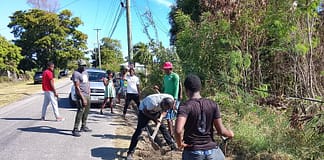
Remittance To The Caribbean Declined In 2023
Remittance to the Caribbean region declined in 2023, according to the latest data analyzed by News Americas from the World Bank’s Migration and Development Brief.
After a period of strong growth during 2021-2022, officially recorded remittance flows to the Caribbean in 2023 totaled USD 19.499 billion, according to the NewsAmericasNow.com analysis.
This is a decrease from the USD 20.144 billion recorded in 2022.
The only countries to report an increase in remittance inflows over 2022 were the Dominican Republic, Haiti, Belize, Trinidad and Tobago, St. Vincent and the Grenadines, Grenada, and St. Lucia.
Countries that saw no change were Guyana, Barbados, St. Maarten, Aruba, Antigua & Barbuda, and the Cayman Islands. Countries recording a decline included Jamaica, Curacao, The Bahamas, Suriname, St. Kitts & Nevis, and Dominica.
The 2023 remittance flow from the most to the least per country, based on the World Bank data, is as follows:
Here is the tabulated data for the totals of 2022 and 2023

| Country | 2022 – USD Billions/Millions | 2023- USD Billions/Millions |
|---|---|---|
| Dominican Republic | 10,619 | 10,278 |
| Haiti | 4,247 | 3,798 |
| Jamaica | 3,567 | 3,688 |
| Guyana | 525 | 525 |
| Trinidad & Tobago | 204 | 200 |
| Curacao | 116 | 159 |
| Belize | 152 | 142 |
| Suriname | 147 | 148 |
| St. Vincent/Grenadines | 92 | 89 |
| Barbados | 85 | 85 |
| Grenada | 82 | 70 |
| St. Lucia | 64 | 62 |
| Sint Maarten | 48 | 48 |
| The Bahamas | 42 | 58 |
| Aruba | 38 | 38 |
| St. Kitts & Nevis | 36 | 38 |
| Antigua and Barbuda | 35 | 35 |
| Dominica | 34 | 38 |
| Cayman Islands | 10 | – |
GLOBALLY
Globally, remittance flows to low- and middle-income countries (LMICs) moderated in 2023, reaching an estimated $656 billion, according to the World Bank’s latest Migration and Development Brief released today.
The modest 0.7% growth rate reflects large variances in regional growth. Nevertheless, remittances remained a crucial source of external finance for developing countries in 2023, bolstering the current accounts of several nations grappling with food insecurity and debt issues. In 2023, remittances surpassed foreign direct investment (FDI) and official development assistance (ODA). Remittance flows increased most to Latin America and the Caribbean (7.7%), followed by South Asia (5.2%), and East Asia and Pacific (4.8%, excluding China). Sub-Saharan Africa saw a slight decline of 0.3%, while the Middle East and North Africa experienced a nearly 15% drop, and Europe and Central Asia saw a 10.3% fall.
Looking ahead, remittances to LMICs are expected to grow at a faster rate of 2.3% in 2024, although this growth will be uneven across regions. Potential downside risks to these projections include weaker-than-expected economic growth in high-income migrant-hosting countries and volatility in oil prices and currency exchange rates.
“Migration and resulting remittances are essential drivers of economic and human development,” said Iffath Sharif, Global Director of the Social Protection and Jobs Global Practice at the World Bank. “Many countries are interested in managed migration in the face of global demographic imbalances and labor deficits on the one hand, and high levels of unemployment and skill gaps on the other. We are working on partnerships between countries sending and receiving migrants to facilitate training, especially for youth, to get the skills needed for better jobs and income at home and in destination countries.”
“The resilience of remittances underscores their importance for millions of people,” said Dilip Ratha, lead economist and lead author of the report. “Leveraging remittances for financial inclusion and capital market access can enhance the development prospects of recipient countries. The World Bank aims to reduce remittance costs and facilitate formal flows by mitigating political and commercial risks to promote private investment in this sector.”
Sending remittances remains costly. In the fourth quarter of 2023, the global average cost of sending $200 was 6.4% of the amount being sent, slightly up from 6.2% a year earlier and well above the SDG target of 3%. Digital remittances had a lower cost of 5%, compared with 7% for non-digital methods, highlighting the benefits of technological advancements in reducing the financial burden on migrants.
With remittances growing in importance, accurate data collection is essential to support the UN Sustainable Development Goals on reducing costs and increasing volume. However, statistical data remain inconsistent and incomplete. The global gap between inward and outward remittance flows has widened, with informal channels being a major factor, such as migrants carrying cash by hand when they return home. The International Working Group to Improve Data on Remittance Flows (RemitStat) will release a report later this year with recommendations for improving data.
Advertise with the mоѕt vіѕіtеd nеwѕ ѕіtе іn Antigua!
We offer fully customizable and flexible digital marketing packages.
Contact us at [email protected]

















Is that going to be deposited in CUB or Global only to disappear like the million that was donated for the restoration of Barbuda?
Enquiry minds want to know.
Or will the creative self enrichment dictator Gaston Browne make it vanish into thin air.
Hoe come they owning record data into the Caribbean and not out. One would be able to see if their is a balance in receiving and sending funds. This is a very onesided analysis. Because one thing we know that our trade balance is negative. Almost everything we consume is imported from either North America, Europe and now China as well
Hoe come they owning record data into the Caribbean and not out. One would be able to see if their is a balance in receiving and sending funds. This is a very onesided analysis. Because one thing we know that our trade balance is negative. Almost everything we consume is imported from either North America, Europe and now China as well…
They should do another list showing the amount of money leaving those countries. I’m pretty sure Antigua would be near the top of the list.
Most people utilize the bank and other methods of sending/receiving $ nobody have time to be wasting with these troublesome conventional methods anymore they will continue to loose business
Comments are closed.